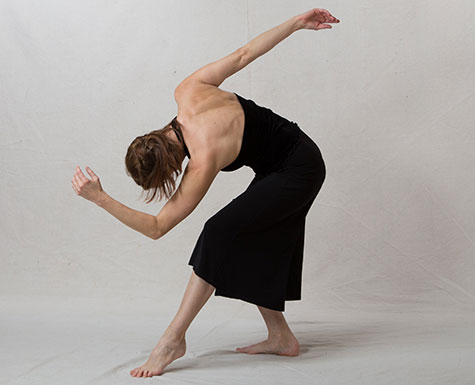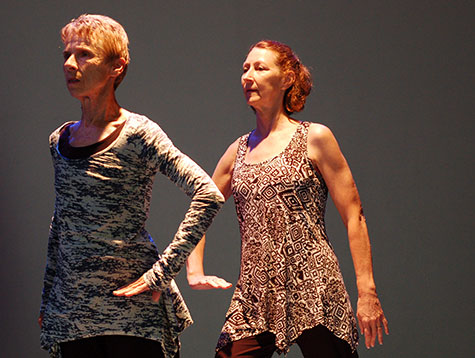
Look. Listen. Inhale. Exhale.
In “December,” David Marchant explores the fragmentary nature of memory. The dance creates a series of non-linear, moving “photographs” that are formed as viewers open and close their eyes to the rhythms of human breathing.
On Sept. 4, 5 and 6, Marchant, professor of the practice in dance, will present “December” as part of Washington University in St. Louis’ 2014 “Dance Close Up” performance.
The intimate, informal concert — which has helped launch St. Louis’ fall performing arts season since 1995 — will showcase new and original works by dance faculty in the Performing Arts Department in Arts & Sciences and University College in Arts & Sciences. The program will range from ballet and Indian classical dance to contemporary solos and duets.
“Dance is both an art form and a daily practice,” said Marchant, who serves as artistic director for “Dance Close Up.” “It’s an event that you prepare for but also a discipline that you engage in everyday.
“This concert represents an opportunity for the dance faculty to share the tremendous breadth of styles, backgrounds and approaches that define both our public work — our art and our professional research, so to speak — and the movement practices that are fundamental to the way we live our lives.”
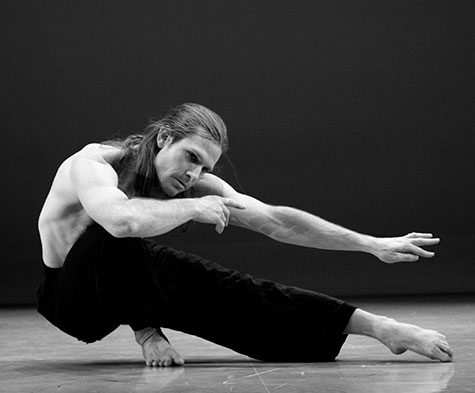
In addition, at 6:30 p.m. Saturday, Sept. 6, Marchant — who coordinates the Somatic Studies Certificate program in University College — will host a panel discussion on “Somatics and Dance: The Mind in the Movement” with faculty from the University College Somatic Studies program, several of whom are also performing dances in the showcase.
First coined by the philosopher Thomas Hanna in 1976, the term “somatics” refers to a spectrum of movement disciplines and techniques oriented around self-awareness and self-knowledge in daily activity, rather than artistic public performance.
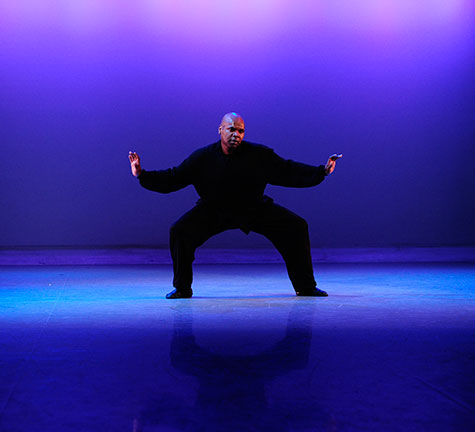
Program
The program will present 10 works choreographed and performed by full-time and adjunct faculty. Also featured:
“Mister”: Cecil Slaughter, professor of the practice in dance, choreographs and performs this solo about reflecting on a life’s journey.
“Ebb and Flow”: Created and performed by Mary-Jean Cowell and Cynthia Kahn, “Ebb and Flow” is about “the shifting energies within and between dancers’ movements.” The gestural material, based in the Michio Ito Technique, is essentially abstract but takes on metaphorical resonance within the context of the music, partially contributed by local composer James Hegarty, and the dancers’ specific choices. Cowell is associate professor in dance. Kahn is assistant to the chair.
“Smoothing the Scars”: Adjunct instructor Mary Ann (Rund) Reis explores the often-unconscious physical expressions of cumulative stress, pain and grief, as well as their potentials for release.

“Miss Lily”: Christine Knoblauch-O’Neal, professor of the practice in dance and director of the Ballet Program, enlists a collage of dance styles for this solo character study.
“Shiva as the Embodiment of Rhythm”: Adjunct instructor Asha Prem choreographs and performs this contemporary take on Indian classical dance.
“In the Pocket”: Adjunct instructor Wendy Ballard explores the sense of joy shared between audience and performer, reveling in the moment when both parties acknowledge dance being done “in the pocket” — that is, creating a recognizable and infectious groove or rhythm.
“Au Lavoir”: Adjunct instructor Dawn Karlovsky presents a solo excerpt from her recent performance collaboration with a painter and dance artist in Nerac, France held at a wash-house dating back to the Middle Ages.
“Short Fables by Franz Kafka”: Percussionist Henry Claude, teacher of applied music, and St. Louis cellist Tracy Andreotti read four short Kafka fables to original musical accompaniment.
“Lonely”: Centered on the theme of child homelessness, this piece by adjunct instructor Ashley Tate uses the power of dance to build community and awareness.
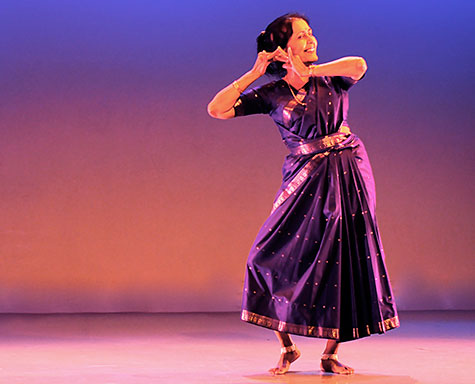
Tickets
Performances begin at 8 p.m. Thursday, Friday and Saturday, Sept. 4-6. The panel discussion on Somatics will precede the 6:30 p.m. Saturday performance.
The panel discussion is free. Tickets to the performances are $17 for the general public and $12 for students, children, senior citizens and Washington University faculty and staff. Floor-mat seating — in keeping with the event’s intimate, informal atmosphere — is available for $6. Tickets are available at the Edison Theatre Box Office.
All events take place in the Annelise Mertz Dance Studio, located in Mallinckrodt Center, 6445 Forsyth Blvd. For more information, call the Box Office at 314-935-6543.
